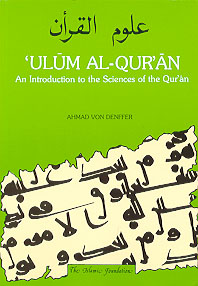Ulum al Qur'an (Sciences of the Qur'an)

An Introduction to the Sciences of the Qur'an
Introduction
AHMAD VON DENFFER
The Qur'an contains the revelations of Allah, the Creator and Sustainer of the Universe, to mankind. It is the message from God to man and therefore of utmost importance to us. To properly grasp a message, one needs first of all to understand its contents exactly, and for this purpose one must study the Qur'an deeply and in detail. In fact, some people do spend their whole lives studying the Qur'an, reading and reflecting upon it and, as they grow and develop, both physically and spiritually, they discover for themselves new meanings and implications.
Secondly, some special knowledge of the circumstances that surround the message is also necessary for fuller understanding of its meaning and implications. Although some part of this special knowledge can be derived from the Qur'an itself, there remain other areas of knowledge that can only be discovered by wider study and research.
Muslims have from earliest times, applied themselves not only to the message from Allah the Qur'an but also to its setting and framework, and the preoccupation with these ultimately developed into the 'sciences' of or 'knowledge' about the Qur'an, known as "ulum al-qur'an'.
The proper approach to the Qur'an, in my humble view, can be described in three stages. You must:
first, receive the message of the Qur'an, by hearing or reading it;
second, understand the message of the Qur'an by reflecting upon it and studying its meanings;
third, apply the message of the Qur'an by ordering your personal life as well as the life of society according to its message.
The branch of knowledge, called 'ulum al-Qur'an may be used as a means for the accomplishment of the second stage, understanding the message of the Qur'an, by understanding its setting and circumstances.
According to a general definition, 'ulum al-qur'an [Sabuni, Muhammad 'Ali: al-tibyan fi 'ulum al-qur-an, Beirut, 1970, p. 10.] denotes studies concerned with the book of revelations sent down upon the last Prophet Muhammad, [The customary blessings on the Prophet (Allah's blessings and peace beupon him) each time his name is mentioned will not be repeated in the text, but the reader is kindly requested to observe this Muslim tradition.]namely:
- Its revelation.
- Its collection.
- Its order and arrangement.
- Its writing down.
- Information about the reasons and occasions of revelation.
- About what was revealed in Makka and what in Madina.
- About the abrogating and abrogated verses.
- About the 'clear' and the 'unclear' verses.
The term also covers Qur'an-related studies, such as:
- The explanation of verses and passages by the Prophet himself, his Companions, their followers and the later exegetes of the Qur'an.
- The methods of explanation.
- The scholars of exegesis and their books.
The aim of this book as all 'ulum al-qur'an is to help towards a better understanding of the Qur'anic message by providing information on its setting, framework and circumstances. To a great extent it is a descriptive account of the traditional subject of 'ulum al-qur'an. Some branches of 'ulum al-qur'an, such as the divisions of the text, style, literary form etc., have only been touched upon briefly, while others that seemed more important have been dealt with in more detail. In particular such topics related to the understanding of the text (asbab al-nuzul, al-nasikh wa al-mansukh, etc.) have been treated more extensively while others, such as the 'seven ahruf' or the 'Uthmanic writing, which are of benefit only to readers with a good knowledge of classical Arabic, have been introduced, but not elaborated upon.
I have restricted myself to presenting the generally-accepted views on the issues and, where no consensus exists, have referred to the most important of the divergent opinions. Although I do have my own views on some questions, my basic aim in this 'Introduction' is generally to inform the reader about the subject, and not to guide him overtly or covertly towards my own conclusions.
There are a number of matters related to the study of the Qur'an to which I have drawn special attention since this 'Introduction' to the 'ulum al-qur'an is aimed at a special readership, namely, young educated Muslims with little or no access to the original sources on the subject. I have therefore included several topics, of special relevance for that readership, such as:
- Orientalists and the Qur'an.
- Translations of the Qur'an.
- Modern interpretation of the Qur'an.
- Language of the Qur'an.
- Reading and recitation of the Qur'an.
Again, particularly for the benefit of these readers, I have often quoted typical examples to illustrate the various points discussed and make them more easily comprehensible.
Finally, to assist readers not familiar with Arabic, I have supplied references to English translations, where available (such as translation of hadith books, etc.). However, on certain topics (e.g. asbab al-nuzul or al-nasikh wa al-mansukh) there is no literature available as yet in English and references had to be restricted to Arabic sources only.
I have also attempted to note in the bibliography at least one or two books in English for each section, from which more insight may be gained on the topic discussed.
May this volume (to the best of my knowledge, the first of its kind in a European language) fulfil its purpose and assist you to grasp fully the message of the Qur'an and to apply it in your life, and may Allah accept this humble effort and forgive its shortcomings.
Ahmad von Denffer
LeicesterRamadan 1981/1401
